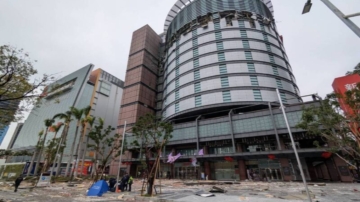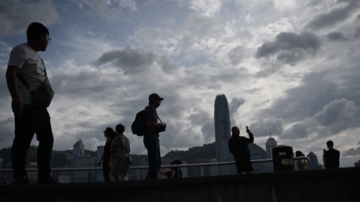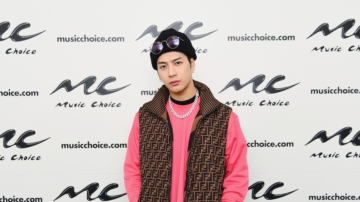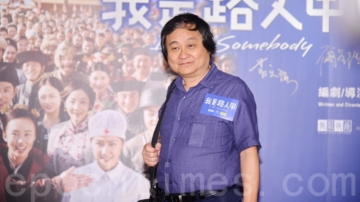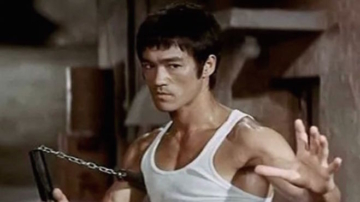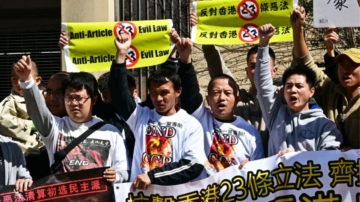【新唐人2013年06月14日讯】美国前中情局雇员斯诺登,被列为美国史上三大揭密者之一。他最近逃亡香港,向外界透露了美情报机构制定的“棱镜”计划,他指称,计划包括了监控美国民众的互联网、电话等各项讯息。目前在香港藏身的斯诺登,他的去留牵动美中关系和相互间的角力。请看报导。
目前在香港藏身的斯诺登,今年29岁,之前是美国中央情报局的雇员。他上周向英国《卫报》揭露,美国情报机构通过“棱镜”计划,大范围收集并监控网路和电话使用者讯息。
事件曝光后,立刻引起轰动。
美国国安局局长基斯•亚历山大耶,被迫在参议院情报委员会作证。但他表示,采取广泛秘密监控手段,阻止了“数十起”可能的恐怖攻击。
13号的《纽约时报》透露,香港当地政府律师与美国政府律师合作,已经确认了斯诺登的36项罪名,其中包括泄露官方机密罪。这在香港和美国都是违法行为,斯诺登可能将面临引渡。
旅美政论家伍凡认为,斯诺登滞留香港和爆料的时机都很可疑。他表示,这次“奥、习会”之后,没有提人权问题,很可能受到此案影响。
旅美政论家伍凡: “有两种可能,一个是他被发现了,他要逃跑﹔第二个,他要出欧巴马洋相。在欧巴马和习近平会还没有散的时候,他就通过英国的《卫报》,把美国的机密、跟踪机密曝光了。目地是干甚么呢?也就是堵住欧巴马的中国人权问题。”
香港《明报》指出,斯诺登滞留香港之事,使当初被认为是获利者的北京,也愈来愈显得尴尬,因为:习、奥刚刚会谈过,在利益至上、不计道义、实用主义的中共,断不会为斯诺登与美方翻脸﹔但如果中方以外交权属,指示香港特区将他引渡回美,则成国内外话柄。
斯诺登在接受采访时表示,“来到香港泄密和接受采访,是因为香港有保护言论自由和异议者人权的承诺,是地球上为数不多的可以抵抗美国政府势力的地方。”他让香港人来决定他的命运。
时事评论员蓝述:“这种说法是站不住脚的,尤其是从一个特工嘴里说出来。实际上整个世界都知道,香港它是受到北京的直接控制的,在香港这个地方,很难有任何公正的司法程序可言的。他的选择本身就有问题。”
旅美经济学家何清涟撰文指出,几大国际人权组织每年都将中国列为“新闻自由之敌”、“互联网之敌”,对中共政府迫害异议人士、人体器官移植更是强烈的人道谴责。这些消息在英文世界里比比皆是。
何清涟还表示,斯诺登选择奥、习会谈结束的当晚,通知记者,用公开采访的形式曝光自己的真实身份,采访结束后立即从旅馆退房,据说躲进了有人为他准备好的安全屋。
何清涟质疑﹕安全屋是谁提供的﹖而在欧巴马与习近平商讨解决黑客攻击之时,斯诺登通过公布美国监控电话与网络,似乎想证明美国的民主人权是虚伪的。
斯诺登12号还爆料,美国已入侵中国和香港的电脑4年,攻击的目标达到上百个。斯诺登的这一爆料,占据中国大多数主要报纸的头条。
但何清涟文中表示,美、中两国监控的目标不同,美国监控是为了反恐的公共安全需要,中国的网络监控是为了维护政权的需要。
而“北京科技大学”管理学院教授赵晓也在微博上提出,年轻而天真的斯诺登不知道的是:正是美国的自由,造成了极端分子的可乘之机。而极端分子、恐怖份子和当年的苏联红色集团,利用西方自由,“成功”实现它们的梦想之日,就是全世界彻底失去自由、全人类陷入奴役之时。
采访/易如 编辑/宋风 后制/萧宇
What Young & Naive Snowden Doesn’t Know
Former CIA employee Edward Snowden has made
one of the biggest leaks in the history of U.S. intelligence.
He has exposed the U.S. government’s secret program,
which snoops on the daily phone and internet
communications, of ordinary Americans.
Snowden is now believed to be still hiding in Hong Kong.
The question of what his next move will be
has seriously affected US-China relations,
leading to a political wrestling match between
the two countries’ governments.
29-year-old Edward Snowden, an ex-CIA employee,
remains in hiding.
Last week, Snowden leaked the secrets about
CIA’s Prism program, to the UK’s Guardian newspaper.
The plan targets phone and internet surveillance.
The exposure of this covert activity by the US government
immediately became an international sensation.
Keith Alexander, the National Security Agency director,
has testified before a Senate Appropriations Committee.
He has stated that the covert surveillance program
has helped to stop “dozens of” terrorist acts.
On June 13, the New York Times quoted “a person with
knowledge of the Hong Kong government’s work on the case”.
It said that “local government lawyers,
working with the U.S. government lawyers,
had identified 36 offenses with which
Snowden could be charged.”
Reportedly, “one of the 36 offenses involves
the release of official secrets,
this activity is illegal in both Hong Kong and the USA.”
Snowden may face extradition back to the USA for trial.
US-based critic Wu Fan questions the timing that
Snowden has chosen to leak information and
to stay in Hong Kong.
Wu Fan says that the issue of human rights was not
mentioned during the recent Obama-Xi meet.
This might be a result of the far reaching
influence and ramifications of this case.
Wu Fan: “Two possibilities exist.
One is that he was discovered, so he fled;
The second is that he wanted to disgrace Obama.
He had exposed US secrets before the end of
the Obama-Xi meet. What was his motive?
That was to shut up Obama about mentioning
human rights in China.”
Hong Kong's Ming Pao newspaper comments that
Snowden’s stay in Hong Kong has increasingly
embarrassed the Chinese Communist Party.
The article explains that the CCP has been seen as
a beneficiary from the scandal of this leak.
The CCP is also known for prioritizing it’s own interests,
for pragmatism, and for disregarding morality.
According to Ming Pao, the Obama-Xi summit just ended,
so the CCP won’t fall out with the U.S. over Snowden.
If the CCP officially instructs Hong Kong to
extradite Snowden back to the U.S.,
that will without doubt make the regime
a target of public criticism.
Snowden has told media that he had fled to Hong Kong
because the city has a history of
protecting free speech and dissidents.
He told the Guardian that Hong Kong is known as
“one of few places in the world that both could
and would, resist the dictates of the US government.”
In a recent media interview, Snowden said that
he had asked for Hong Kong to decide his fate.
(Critic) Lan Shu: “His argument is untenable,
especially as he was an agent.
In reality, everyone knows that Hong Kong is
under the thumb of the CCP authorities,
where there hardly exists a fair judicial process.
His choice is therefore questionable.”
He Qinglian, a US-based economist,
has pointed out in her articles that each year,
major international human rights organizations
put China on the lists of “enemies of press freedom and of the internet”.
The CCP authorities have met strong international
criticism for their repression of dissidents and
for their organ harvesting from living, innocent victims.
All of this is not news in the English-speaking world.
He Qinglian continued, saying that Snowden
had revealed his identity in an on-the-record interview
on the night of the same day
that the Obama-Xi summit ended.
After the interview, he reportedly checked out of
his hotel, and hid in an undisclosed “safe house”.
He Qinglian asks:
“Who provided the safe house for Snowden?”
Snowden’s exposure of CIA phone and internet
surveillance had taken place when Obama was in discussions with Xi,
exploring ways to tackle the issue of cyber hacking.
It seems that Snowden wanted to prove that
the US democracy and human rights image is
misleading and is hypocritical, this is a view of
the situation according to He Qinglian.
On June 12, Snowden alleged that for the past four years,
US intelligence agents have hacked hundreds of
computers in China, and in Hong Kong.
This allegation has made headlines
in China’s major newspapers.
He Qinglian indicates that in terms of covert surveillance,
the US administration and the Chinese authorities
have different purposes for their activities.
For the U.S. part, the government uses it to protect
public safety against terrorism.
Whilst for the CCP authorities, their internet monitoring
serves uniquely to stabilize the regime.
Zhao Xiao, renowned Chinese economist,
comments on the issue in his micro-blog.
He says, “What young and naive Snowden
doesn’t know is that
it is the American freedom that
has given access to extremists.
The extremists, terrorists and the Soviet Union communist
regime, all took advantage of Western freedom.
The day when they "successively "achieved
their dreams was the day when the whole world
completely lost it’s hard won freedom
and when all mankind was reduced to slavery.”
目前在香港藏身的斯诺登,今年29岁,之前是美国中央情报局的雇员。他上周向英国《卫报》揭露,美国情报机构通过“棱镜”计划,大范围收集并监控网路和电话使用者讯息。
事件曝光后,立刻引起轰动。
美国国安局局长基斯•亚历山大耶,被迫在参议院情报委员会作证。但他表示,采取广泛秘密监控手段,阻止了“数十起”可能的恐怖攻击。
13号的《纽约时报》透露,香港当地政府律师与美国政府律师合作,已经确认了斯诺登的36项罪名,其中包括泄露官方机密罪。这在香港和美国都是违法行为,斯诺登可能将面临引渡。
旅美政论家伍凡认为,斯诺登滞留香港和爆料的时机都很可疑。他表示,这次“奥、习会”之后,没有提人权问题,很可能受到此案影响。
旅美政论家伍凡: “有两种可能,一个是他被发现了,他要逃跑﹔第二个,他要出欧巴马洋相。在欧巴马和习近平会还没有散的时候,他就通过英国的《卫报》,把美国的机密、跟踪机密曝光了。目地是干甚么呢?也就是堵住欧巴马的中国人权问题。”
香港《明报》指出,斯诺登滞留香港之事,使当初被认为是获利者的北京,也愈来愈显得尴尬,因为:习、奥刚刚会谈过,在利益至上、不计道义、实用主义的中共,断不会为斯诺登与美方翻脸﹔但如果中方以外交权属,指示香港特区将他引渡回美,则成国内外话柄。
斯诺登在接受采访时表示,“来到香港泄密和接受采访,是因为香港有保护言论自由和异议者人权的承诺,是地球上为数不多的可以抵抗美国政府势力的地方。”他让香港人来决定他的命运。
时事评论员蓝述:“这种说法是站不住脚的,尤其是从一个特工嘴里说出来。实际上整个世界都知道,香港它是受到北京的直接控制的,在香港这个地方,很难有任何公正的司法程序可言的。他的选择本身就有问题。”
旅美经济学家何清涟撰文指出,几大国际人权组织每年都将中国列为“新闻自由之敌”、“互联网之敌”,对中共政府迫害异议人士、人体器官移植更是强烈的人道谴责。这些消息在英文世界里比比皆是。
何清涟还表示,斯诺登选择奥、习会谈结束的当晚,通知记者,用公开采访的形式曝光自己的真实身份,采访结束后立即从旅馆退房,据说躲进了有人为他准备好的安全屋。
何清涟质疑﹕安全屋是谁提供的﹖而在欧巴马与习近平商讨解决黑客攻击之时,斯诺登通过公布美国监控电话与网络,似乎想证明美国的民主人权是虚伪的。
斯诺登12号还爆料,美国已入侵中国和香港的电脑4年,攻击的目标达到上百个。斯诺登的这一爆料,占据中国大多数主要报纸的头条。
但何清涟文中表示,美、中两国监控的目标不同,美国监控是为了反恐的公共安全需要,中国的网络监控是为了维护政权的需要。
而“北京科技大学”管理学院教授赵晓也在微博上提出,年轻而天真的斯诺登不知道的是:正是美国的自由,造成了极端分子的可乘之机。而极端分子、恐怖份子和当年的苏联红色集团,利用西方自由,“成功”实现它们的梦想之日,就是全世界彻底失去自由、全人类陷入奴役之时。
采访/易如 编辑/宋风 后制/萧宇
What Young & Naive Snowden Doesn’t Know
Former CIA employee Edward Snowden has made
one of the biggest leaks in the history of U.S. intelligence.
He has exposed the U.S. government’s secret program,
which snoops on the daily phone and internet
communications, of ordinary Americans.
Snowden is now believed to be still hiding in Hong Kong.
The question of what his next move will be
has seriously affected US-China relations,
leading to a political wrestling match between
the two countries’ governments.
29-year-old Edward Snowden, an ex-CIA employee,
remains in hiding.
Last week, Snowden leaked the secrets about
CIA’s Prism program, to the UK’s Guardian newspaper.
The plan targets phone and internet surveillance.
The exposure of this covert activity by the US government
immediately became an international sensation.
Keith Alexander, the National Security Agency director,
has testified before a Senate Appropriations Committee.
He has stated that the covert surveillance program
has helped to stop “dozens of” terrorist acts.
On June 13, the New York Times quoted “a person with
knowledge of the Hong Kong government’s work on the case”.
It said that “local government lawyers,
working with the U.S. government lawyers,
had identified 36 offenses with which
Snowden could be charged.”
Reportedly, “one of the 36 offenses involves
the release of official secrets,
this activity is illegal in both Hong Kong and the USA.”
Snowden may face extradition back to the USA for trial.
US-based critic Wu Fan questions the timing that
Snowden has chosen to leak information and
to stay in Hong Kong.
Wu Fan says that the issue of human rights was not
mentioned during the recent Obama-Xi meet.
This might be a result of the far reaching
influence and ramifications of this case.
Wu Fan: “Two possibilities exist.
One is that he was discovered, so he fled;
The second is that he wanted to disgrace Obama.
He had exposed US secrets before the end of
the Obama-Xi meet. What was his motive?
That was to shut up Obama about mentioning
human rights in China.”
Hong Kong's Ming Pao newspaper comments that
Snowden’s stay in Hong Kong has increasingly
embarrassed the Chinese Communist Party.
The article explains that the CCP has been seen as
a beneficiary from the scandal of this leak.
The CCP is also known for prioritizing it’s own interests,
for pragmatism, and for disregarding morality.
According to Ming Pao, the Obama-Xi summit just ended,
so the CCP won’t fall out with the U.S. over Snowden.
If the CCP officially instructs Hong Kong to
extradite Snowden back to the U.S.,
that will without doubt make the regime
a target of public criticism.
Snowden has told media that he had fled to Hong Kong
because the city has a history of
protecting free speech and dissidents.
He told the Guardian that Hong Kong is known as
“one of few places in the world that both could
and would, resist the dictates of the US government.”
In a recent media interview, Snowden said that
he had asked for Hong Kong to decide his fate.
(Critic) Lan Shu: “His argument is untenable,
especially as he was an agent.
In reality, everyone knows that Hong Kong is
under the thumb of the CCP authorities,
where there hardly exists a fair judicial process.
His choice is therefore questionable.”
He Qinglian, a US-based economist,
has pointed out in her articles that each year,
major international human rights organizations
put China on the lists of “enemies of press freedom and of the internet”.
The CCP authorities have met strong international
criticism for their repression of dissidents and
for their organ harvesting from living, innocent victims.
All of this is not news in the English-speaking world.
He Qinglian continued, saying that Snowden
had revealed his identity in an on-the-record interview
on the night of the same day
that the Obama-Xi summit ended.
After the interview, he reportedly checked out of
his hotel, and hid in an undisclosed “safe house”.
He Qinglian asks:
“Who provided the safe house for Snowden?”
Snowden’s exposure of CIA phone and internet
surveillance had taken place when Obama was in discussions with Xi,
exploring ways to tackle the issue of cyber hacking.
It seems that Snowden wanted to prove that
the US democracy and human rights image is
misleading and is hypocritical, this is a view of
the situation according to He Qinglian.
On June 12, Snowden alleged that for the past four years,
US intelligence agents have hacked hundreds of
computers in China, and in Hong Kong.
This allegation has made headlines
in China’s major newspapers.
He Qinglian indicates that in terms of covert surveillance,
the US administration and the Chinese authorities
have different purposes for their activities.
For the U.S. part, the government uses it to protect
public safety against terrorism.
Whilst for the CCP authorities, their internet monitoring
serves uniquely to stabilize the regime.
Zhao Xiao, renowned Chinese economist,
comments on the issue in his micro-blog.
He says, “What young and naive Snowden
doesn’t know is that
it is the American freedom that
has given access to extremists.
The extremists, terrorists and the Soviet Union communist
regime, all took advantage of Western freedom.
The day when they "successively "achieved
their dreams was the day when the whole world
completely lost it’s hard won freedom
and when all mankind was reduced to slavery.”

